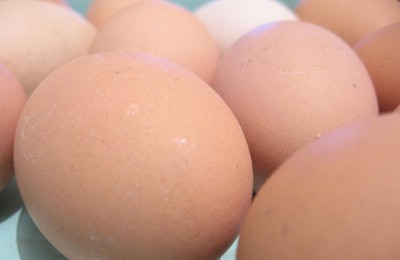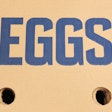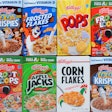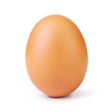
Pledging to sell only cage-free eggs in the near future, Carrefour Taiwan has received the Asia Pacific Social Innovation Partnership award for its campaign to end battery cages for egg production.
It was a visit to the Environment and Animal Society of Taiwan (EAST) last year that convinced one of the country’s largest retailers to move away from battery eggs. At that time, 90 percent of Taiwan’s eggs were produced by caged hens.
Battery cages represent “serious animal welfare and food security problems,” the firm’s Corporate Social Responsibility and Communications Director, Mailyn Su has told Taiwan News.
Su highlighted the birds’ inability to carry out natural behavior when housed in battery cages, and alleged these conditions offer an unhealthy and malodorous environment for the birds and to food safety issues. She cited local health scares that led to the removal of eggs from retailers’ shelves following the mixing of expired and fresh eggs, and fipronil contamination.
With only one percent of Taiwan’s eggs produced under free-range conditions at the time, consumers were misled into buying brown eggs and those in expensive packaging, thinking them to be produced under more animal welfare-friendly conditions, she said. This situation also meant Taiwanese free-range egg producers were unable to obtain a premium to help cover their additional production costs.
By raising these issues, Carrefour was approached by cage-free egg producers, and the retailer has been selling eggs from six of them that are certified by EAST since last year.
Also using only free-range eggs in its cooked products, this category now account for 15 percent of the retailer’s total egg sales—up from 5 percent a year ago, according to Su.
In May of 2018, Carrefour Group announced its Taiwanese subsidiary would start to sell only free-range eggs under its own brand from this year. By next year, the firm committed to sell only free-range eggs from Carrefour Quality Line hens in Taiwan, and to work with suppliers and clients to reach the target of 100-percent cage-free egg sales by 2025.
In 2017, the Group committed to sell under its own brand eggs produced by hens housed cage-free by 2025. Within Europe, the firm had already achieved that goal in Spain and Romania, and pledged to set targets for its home market — France — as well as Italy, Poland, and Belgium.
Carrefour Brazil had already targeted 2025 as a deadline for the sale of cage-free eggs under its own brand, and all egg sales in its stores by 2028.
In 2018, Carrefour Group began its 2022 Transformation Plan, focusing on significant commercial investments, and a program of cost reductions. For the first quarter of 2019, sales were up by 2.7 percent year-on-year, with the strongest growth achieved by its Brazilian affiliate, through organic food sales in France, and via e-commerce.
Carrefour also added eggs and poultry to its portfolio of blockchain foods last year. Among the top 10 food retailers globally, the firm was the first to make this information on poultry products available by smartphone app to attract the interest of younger-generation consumers.
Downloadable PDF resource for cage-free eggs available
Check out a new collection of exclusive articles, blogs and infographics on Cage-free Eggs: Hen Welfare and Housing Challenges. Written by trusted WATT Global Media editors and industry experts, this report will equip egg producers and marketers with information to help them make critical business decisions. Available for purchase now.
















